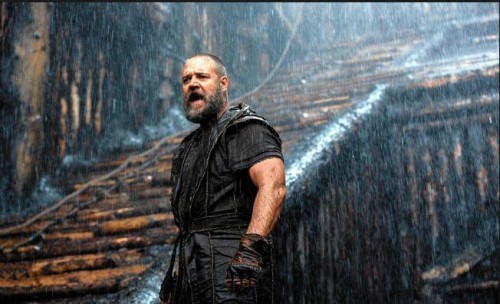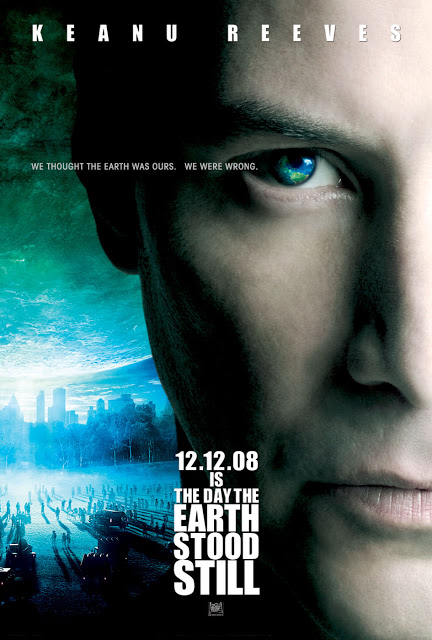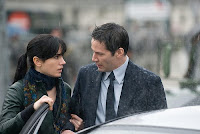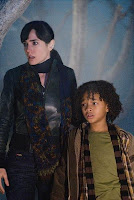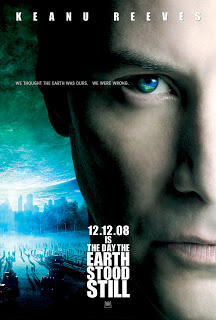
This guest post by Rebecca Willoughby appears as part of our theme week on Dystopias.
I’ve written before about a Darren Aronofsky film that I liked tremendously, Black Swan. I was a fan of The Wrestler and The Fountain. So when news of the director’s intent to tackle a Biblical epic in Noah was revealed, my reaction was a cautious excitement, but also: “Huh?” After seeing it, the “Huh?” response is pretty much still there.
But I was fascinated by Noah as a representation of dystopia, and, by its conclusion, of a supposed utopia. Its thinly veiled save-the-earth message seemed to simultaneously re-tell the Bible story with a new twist, and reinterpret it for non-believers (see also the “updated” environmental message of Scott Derrickson’s 2008 remake of The Day the Earth Stood Still). It was rather a strange experience, however, that for much of the film I had no idea what was going to happen next. That is not how I expected to experience a semi-familiar Bible story I heard many times as a child. These “inaccuracies” comprised the bulk of the negative reviews of the film, like this one from The Guardian.
It was easier then, perhaps, to see its story as a cautionary tale about our own time and place, removed from specifically Christian ideologies (except maybe for the Rock-Biter-esque Nephilim). So while it was clear enough how the film addressed environmental issues such as sustainable growing practices and the exploitation of natural resources, what did it say about other resources, like people? Human capital? Gender roles? Well, these topics were also disintegrating in the dystopic mess.
How dystopian is Noah’s opening act? Well, after a brief VFX sequence summarizing Creation, we fast-forward right to the murder of Noah’s dad at the hands of a young Tubal-Cain (sorry, spoilers…also something I didn’t expect to say in an essay about a Biblical story). Quite frankly, after sitting through the two hour and 20-minute movie, the plot points of the Bible story and the film have blurred a bit. What viewers know for sure is that Adam and Eve have been dispelled from the Garden, murder is a thing (thanks to Cain), and there are two factions of humans. One is the followers of Tubal-Cain, Biblical forger of bronze and iron, who are aggressively industrial, environmentally exploitative, and eat meat (sometimes human, sometimes CGI, pre-flood fantasy animals). Their existence is shown to be difficult, dirty, warrior-like, and (of course) patriarchal. It is only by accident, for instance, that a raiding party of these denizens leaves young Ila (Emma Watson) alive, and their violence has left her barren, though Noah’s wife Naameh (Jennifer Connelly) is able to save her life. This interaction, specifically, highlights differences between the two groups: essentially, one carries death, the other life.
The tribe of Noah are the descendants of Seth (brother of Cain and Abel, for those following along in the Genesis story), who possess a particular set of skills when it comes to the Earth. Members of their line appear to be caretakers of the land and perhaps the first environmentalists. They’re also vegetarians, in case you were wondering. Their existence is also seen to be difficult, and yet because of their family dynamic, close relationships, and respect for all living things, viewers understand that their ethos is preferable. Their costumes are softer, natural fabrics rather than metal armor and leather; they have names and distinct personalities as opposed to a mob-like, metalwork-blackened horde. The film goes a pretty long way to ingratiate these characters to us, most likely because later Noah himself will come close to tearing them all apart. But throughout most of the film, we see two clearly demarcated factions with clearly defined ideological beliefs in direct opposition to each other. Pretty divisive, and therefore pretty dystopian.
Of course we know that the story goes further than just setting up a conflict on the human scale. Noah’s main internal conflict lies in his troubling dreams and visions. His confusion creates tension not only within Noah’s own mind, but also within his family, as he tries to discern what exactly the Creator wants him to do, and to what end. Much of this conflict has to do with reproduction. Throughout the film, he successfully alienates almost everyone dear to him when he comes to believe that the Creator is so distressed with the human state of affairs that He wishes humanity to completely die out. He refuses his sons’ wives, and threatens to kill his grandchildren. His narrative becomes one of punishment for the variety of ills humankind has visited upon the Creator’s Earth, of which he comes to see himself and his family as equally guilty members in spite of their life-focused ethos.
Charting Noah’s emphasis on life and reproduction may illuminate the film’s dystopian arc. Early in the film, Noah experiences a vision of seeing a flower sprout spontaneously from a drop of water. Disturbed by this vision and his frequent dreams of a destructive flood, he seeks out his grandfather, Methuselah (incredibly, Anthony Hopkins). Methuselah gives Noah a seed, which, when planted, sprouts an entire forest full of trees from which to build the ark. While this seed is certainly a sign of life, and gives life to all of this lush CG greenery, it is a resource grown to be exploited in a way not unlike Tubal-cain’s mining operation. Is this permissible because it’s in the service of the Creator?
While the ark-building is happening, Noah’s children are growing up. Including Ila, who has become an adopted daughter, beloved of Noah’s eldest son, Shem. Because she is barren as a result of her childhood encounter with those violent raiders, Noah goes looking for wives for his two younger sons (after all, they have to repopulate the Earth after the flood). But when he arrives at a neighboring encampment, he sees chaos, violence, fire, and animals being ripped apart for food. It isn’t pretty, and we can understand why this vision seems to support Noah’s new interpretation of the Creator’s plan: his family’s purpose is only to save innocent animals, and when that task is done, humans will die off as the last of his family perishes. It is Naameh who cannot reconcile this plan, and she visits Methuselah to ask him to intercede. Here, we have the restrictions of a patriarchal society functioning within the life-driven Noah clan, where the potential for the continuation of the human race seems to rest not with the women who might bear the children, but with the aging male progenitor: his word may sway Noah and save humanity.
Meanwhile, Noah’s son Ham refuses to abide by his father’s wishes (rejection of the patriarchy) and goes to find his own wife. When he’s captured and imprisoned by Tubal-Cain’s league, he meets Na’al, a female captive. As the flood rains begin, the two escape, and Ham leads Na’al toward the ark to save her. But Noah has waded into the forest to find Ham, and as they run from the Cainian hordes, Na’al’s foot is caught in an animal trap and Noah forces Ham to leave her behind (re-establishment of the patriarchal law). They barely make it to the ark in time to be saved from numerous crazy CG geysers contributing to the rain and rising floodwaters.
And, in a surreal but somehow predictable turn of events, Ila encounters Methuselah in the forest and he magically cures her infertility. With his supernatural blessing, she seeks out Shem and they have a passionate moment in the forest just before boarding the ark. We can see where this is going—Ila will become pregnant and bear Noah’s grandchildren—but it’s significant that her ability to reproduce is granted her by the patriarch of Noah’s family.
All the while, Naameh maintains her role as an herbalist and a midwife and maybe the first organic farmer. Though she’s continually shot down, she does consistently object to Noah’s rule; I can’t quite reconcile this review’s characterization of her as a “drip.” And because representation matters, it’s worth noting that I think Connelly is channeling Linda Hamilton’s arms in Terminator 2 even as she participates in traditionally feminine activities like midwifing and healing. It certainly isn’t a feminist world she lives in, but she does her level best to undermine her husband in an enclosed space. As Noah himself veers away from his family tradition of life-supporting environmental husbandry, Naameh continues to practice what he (used to) preach, preserving her daughter-in-law, the animals, and the land once they find it again.
The end of the film predictably sews things back up between Naameh and Noah, especially after he is moved to mercifully spare his twin granddaughters’ lives after feeling only “love” when about to kill them. The patriarchy is duly restored. Yet there are cracks. In an epic case of middle-child syndrome, Ham quells his rebellious attitude but strikes out on his own just as the rainbow covenant moment glows through the denoument. Additionally, I couldn’t help but notice that there STILL isn’t a wife for Japheth, the youngest son. And who’s going to marry/mate with Ila’s daughters? In its final adherence to the Biblical source, Aronofsky’s film leaves some troubling questions even as its narrative may—through its departures from that source— subvert ancient patriarchal structures that are still part of the female dystopia.
Rebecca L. Willoughby holds a Ph.D. in English and Film Studies from Lehigh University. She writes most frequently on horror films and melodramas, and is currently Visiting Assistant Professor at Bucknell University in Lewisburg, Pennsylvania.
